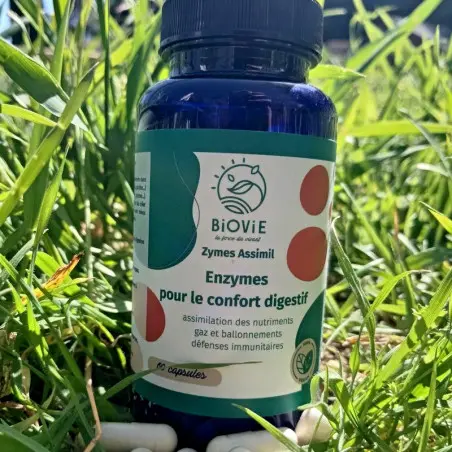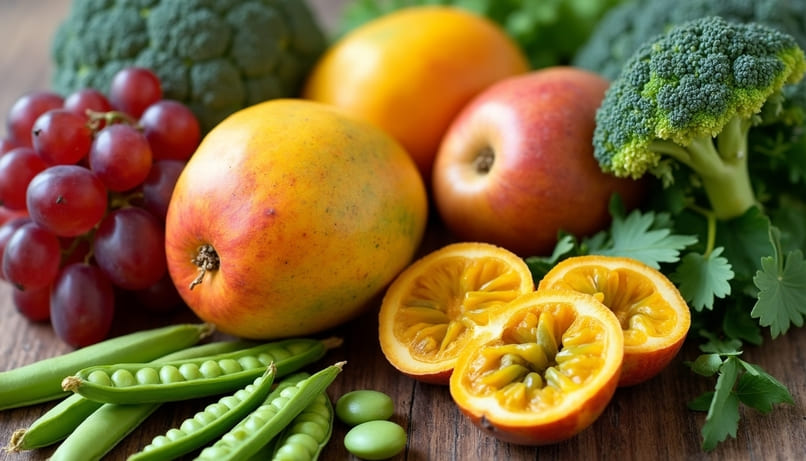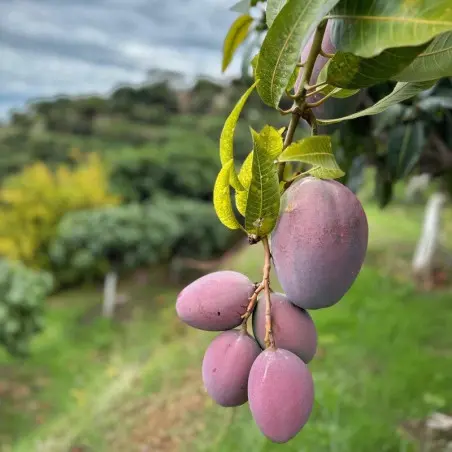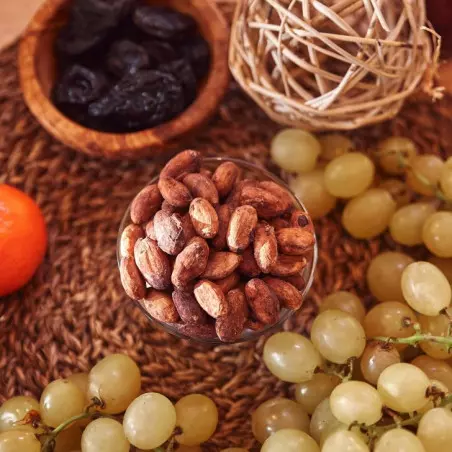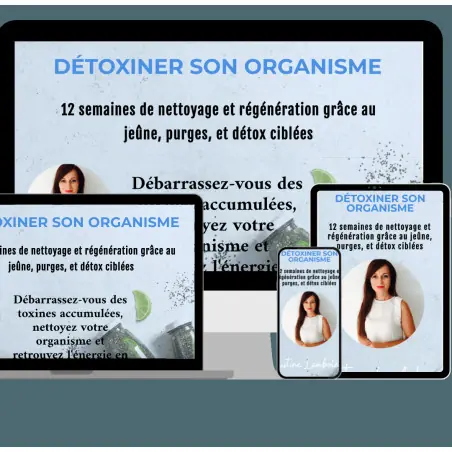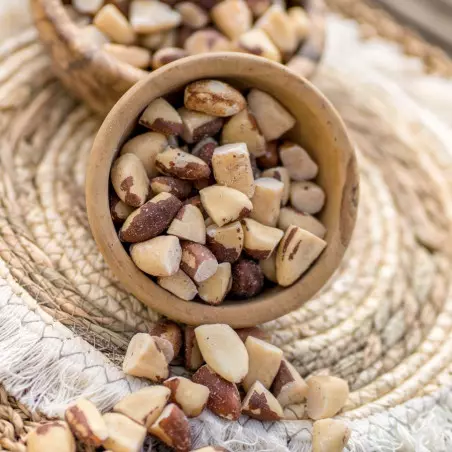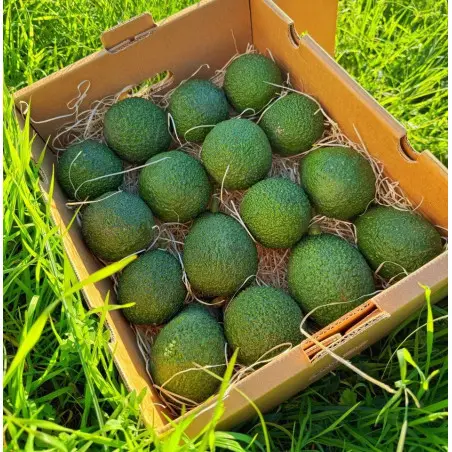Autophagy, a natural process of cellular "cleaning," is increasingly recognized as a key factor in longevity and health. In this article, we will explore the foods and practices that stimulate this fascinating process, focusing on natural and organic options. Whether you are a wellness enthusiast, a naturopath or simply curious about improving your health, you will find valuable information here to integrate autophagy into your daily life.
After reading this article, you will discover:
- What autophagy is and why it is important for your health ;
- Organic foods that naturally stimulate autophagy ;
- The daily practices that promote this process ;
- Practical tips for incorporating these foods and habits into your daily life.
What is autophagy and why is it important ?
Autophagy, literally "to eat oneself" in Greek, is a fascinating cellular process that plays a crucial role in our health and longevity. This natural mechanism of cellular "cleaning" allows our cells to recycle their damaged or unnecessary components, thereby promoting their renewal and proper functioning. The importance of autophagy in maintaining our health and preventing premature aging is increasingly recognized by the scientific community.
This complex biological process acts as an internal sanitation system, eliminating misfolded proteins, dysfunctional organelles, and even intracellular pathogens. By stimulating the autophagic process, we can potentially slow down cellular aging, improve our resistance to diseases, and optimize our cognitive performance. This is why understanding and promoting autophagy has become a major topic of interest for those looking to improve their health in a natural and sustainable way.
The process of autophagy explained simply
Autophagy is a fascinating mechanism that takes place at the very heart of our cells. Imagine it as an ultra-sophisticated recycling and cleaning system, constantly at work to preserve our cellular functions and ensure optimal functioning.
The process begins when the cell identifies damaged or unnecessary components. These elements can be misfolded proteins, dysfunctional organelles, or even pathogens that have managed to infiltrate. Once identified, these components are isolated in a structure called an autophagosome, a sort of "bag" formed by a double membrane.
The autophagosome then fuses with a lysosome, a vesicle containing enzymes powerful digestive processes. This is when the magic happens: enzymes break down cellular components into their basic elements, such as amino acids, sugars, and lipids. These elements are then recycled by the cell to create new structures or provide energy.
This process of cellular "renewal" is crucial for several reasons:
- It eliminates cellular waste that could otherwise accumulate and cause damage.
- It recycles nutrients, allowing the cell to function efficiently even during periods of stress or scarcity.
- It contributes to cellular longevity by maintaining a healthy and functional intracellular environment.
Autophagy is particularly active during fasting periods or cellular stress, acting as a survival mechanism that allows our cells to adapt to changing conditions. By stimulating this natural process, we can potentially improve our overall health and resistance to aging.
It is fascinating to note that this process of cellular cleansing can be influenced by our diet and lifestyle. Raw and organic foods rich in certain compounds, such as resveratrol or spermidine, can stimulate autophagy. Similarly, practices such as intermittent fasting or regular physical exercise can trigger this beneficial process.
By understanding and promoting autophagy, we have the opportunity to optimize the health of our cells, thereby contributing to our overall well-being, a better quality of life, and potentially increasing our lifespan. This is a perfect example of how simple lifestyle choices can have a profound impact on our health at the cellular level.
The surprising benefits of autophagy for health
Autophagy offers health benefits that go far beyond simple cellular cleaning. Let's discover together the surprising benefits of this natural mechanism on the human body:
- Autophagy plays a crucial role in the prevention of age-related diseases. By eliminating damaged or dysfunctional cellular components, it helps keep our cells healthy for longer. Scientific research has shown that stimulating autophagy could reduce the risk of neurodegenerative diseases such as Parkinson's or Alzheimer's disease. For example, research published in the journal Nature revealed that autophagy helps eliminate toxic proteins associated with these diseases.
- The improvement of cognitive function is another surprising benefit of autophagy. By cleaning up cellular debris in the brain, this process promotes neuronal plasticity and the formation of new connections. A study published in Cell Reports demonstrated that the stimulation of autophagy improves memory and learning in animal models.
- Autophagy plays an essential role in strengthening the immune system. She helps to eliminate intracellular pathogens and regulate the inflammatory response. Research published in Nature Immunology highlighted that autophagy is essential for the function of immune cells, particularly T lymphocytes.
It is fascinating to note that this natural process, which we can stimulate through our diet and lifestyle habits, has such a profound impact on our overall health. By adopting a diet rich in raw foods and organic, like those offered on our shop, we can naturally promote autophagy and benefit from its remarkable effects on our body.
Let's not forget that our dietary practices, such as the consumption of raw and organic foods, can play a key role in activating the cellular cleansing process, thus bringing us closer to optimal health and increased longevity. Autophagy reminds us that our body has an innate ability to self-repair and regenerate, provided we give it the right tools.
Foods that naturally stimulate autophagy
Autophagy, this fascinating cellular process, can be naturally stimulated by certain foods rich in specific nutrients. These "superfoods" of autophagy are not only delicious but also incredibly beneficial for our cellular health. In this section, we will explore the key nutrients that promote autophagy and the raw and organic foods that contain them in abundance.
Among the most powerful nutrients for activating autophagy, there is the resveratrol, the Spermidine and various polyphenols. These bioactive compounds act as signals for our cells, encouraging them to trigger the process of autophagy. What is particularly interesting is that these nutrients are naturally found in many raw and organic foods, allowing us to stimulate autophagy simply by adopting a good diet.
It is important to note that the consumption of these foods in their most natural form possible, that is to say raw and organic, maximizes their benefits. Organic farming methods preserve the essential nutrients in food, while consuming raw ensures that these nutrients are not altered by cooking. Thus, by choosing raw and organic foods, we provide our bodies with the best tools to stimulate autophagy and maintain our cellular health.
Resveratrol: A Powerful Activator of Autophagy
The resveratrol, a natural phenolic compound, is recognized as one of the most powerful activators of autophagy. This fascinating polyphenol acts as a caloric restriction mimetic, triggering the same metabolic pathways as fasting, which stimulates the process of autophagy in our cells.
Natural sources of resveratrol
The natural sources of resveratrol are numerous, but organic grapes stand out particularly.
- Red and black grapes,
- Raw cocoa beans,
- Blackberries,
- Cranberries.
Grapes concentrate an impressive amount of resveratrol, primarily in their skin. Red and black grapes are particularly rich in this compound, offering a delicious and effective option to naturally stimulate autophagy.
Advantages of organic grapes
In addition to being an excellent source of resveratrol, organic grapes offer other health benefits:
- Rich in antioxidants,
- Contain essential vitamins,
- Bring important minerals,
- Grown without pesticides or chemicals.
Bioavailability of resveratrol
It is interesting to note that resveratrol in grapes is more bioavailable when consumed raw. Cooking or processing can reduce the resveratrol content, which is why fresh grapes or untreated raisins are particularly beneficial.
How to incorporate organic grapes into your diet
To maximize the benefits of resveratrol, here are some ideas for incorporating organic grapes into your diet:
- As a fresh and raw snack,
- Added to salads of Fruits,
- Incorporated into green smoothies,
- Used as a garnish for Raw desserts,
By regularly consuming organic grapes, you provide your body with a natural dose of resveratrol, thereby promoting autophagy and contributing to overall cellular health. This natural and delicious approach to stimulating this process fits perfectly into a healthy and balanced lifestyle focused on raw and organic foods.
Spermidine: An Essential Nutrient for Autophagy
The Spermidine, a natural compound found in many foods, plays a crucial role in stimulating autophagy. This fascinating polyamine acts as a true trigger for the cellular "cleaning" process, thereby helping to keep our cells healthy and slow down aging.
Foods rich in spermidine are numerous and varied, making its integration into our daily diet both simple and delicious. Among the richest natural sources of spermidine, we find:
- The organic mangoes : These delicious tropical fruits are not only an excellent source of spermidine but also of vitamins and antioxidants. The mangoes biological products available in our store according to the season are grown with respect for the environment and offer a tasty option to naturally boost your autophagy.
- Mushrooms: Rich in nutrients, raw mushrooms are an excellent source of spermidine.
- Sprouted legumes: The germination process increases the spermidine content in legumes.
- The Nuts and seeds : Particularly pistachios and pumpkin seeds, which are rich in spermidine.
Focus on the organic mangoes available in our shop:
The organic mangoes offered by Biovie are an ideal choice for incorporating spermidine into your dietary habits. Grown without pesticides or chemical fertilizers, these mangoes retain all their nutritional richness. Consuming them raw helps preserve the spermidine they contain, thereby maximizing its beneficial effects on autophagy.
To fully benefit from spermidine, it is recommended to consume these foods regularly and in their most natural form possible. Biovie's organic mangoes can be enjoyed as they are, incorporated into raw smoothies, or used to create delicious and nutritious raw desserts.
It is important to note that spermidine works in synergy with other nutrients to stimulate autophagy. A varied diet, rich in raw and organic fruits and vegetables, is therefore key to maximizing the benefits of this essential cellular process.
By incorporating spermidine-rich foods like our organic mangoes into your daily diet, you provide your body with natural support to stimulate autophagy and maintain optimal cellular health.
Cocoa beans: a source of autophagic polyphenols
The raw cacao beans are a true treasure for stimulating autophagy, thanks to their richness in polyphenols. These bioactive compounds, abundantly present in the raw cacao, are recognized for their ability to activate the cellular mechanisms of autophagy. Indeed, the polyphenols in cocoa act as signals for our cells, encouraging them to initiate this internal "cleaning" process that is so beneficial for our health.
The organic raw cacao beans are particularly interesting because they retain all of their nutrients, unlike processed or heated cocoa. These beans contain not only polyphenols but also flavonoids, catechins, and procyanidins, all known for their antioxidant and anti-inflammatory properties.
A study published in the "Journal of Nutritional Biochemistry"showed that the polyphenols from the cocoa can activate autophagy in liver cells, thereby contributing to the protection of the liver against oxidative damage. This discovery highlights the importance of raw cocoa in maintaining cellular health.
The organic raw cacao beans we offer at Biovie are an excellent option for incorporating these benefits into your daily diet. These beans, carefully selected and certified organic, provide a pure and natural source of autophagic polyphenols. You can consume them as they are for an intense taste experience, incorporate them into your smoothies, or use them to prepare delicious and healthy raw desserts.
It is important to note that the consumption of raw cacao should be moderated, as it naturally contains theobromine, a natural stimulant. A portion of 10 to 15 grams per day is generally sufficient to benefit from its autophagic properties without excess.
By regularly incorporating raw organic cacao beans into your diet, you provide your body with a powerful ally to boost autophagy and support your cellular health. It's a delicious and natural way to take care of yourself while enjoying the benefits of an ancient superfood.
Other foods that stimulate autophagy
Autophagy, this natural process of "cellular cleaning," can be stimulated by various natural and organic foods. Here are some additional options to enrich your diet and promote this essential mechanism for your health.
Green peas: a valuable source of spermidine
Green peas are rich in spermidine, a crucial compound for the activation of autophagy.
Advantages of sprouted green peas :
- Increase in nutrient bioavailability,
- Increased concentration of spermidine,
- Ease of integration into daily diet.
Passion fruits and broccoli: unexpected allies
Passion fruitsSure, please provide the text you would like me to translate.
- Rich in polyphenols,
- Potential triggers of autophagy.
BroccoliSure, please provide the text you would like me to translate.
- Contains sulforaphane,
- Promising effects on the activation of autophagy.
Fisetin: A Powerful Flavonoid
This compound, found in certain fruits, is a recognized activator of autophagy.
Natural sources of fisetin:
- Strawberries,
- Apples,
- Persimmons.
The importance of dietary diversity:
To optimize the stimulation of autophagy, it is crucial to vary the sources of nutrients:
- Maximize the effects by consuming these raw and organic foods ;
- Adopt a holistic approach by incorporating different autophagic foods.
Practical advice:
- Gradually incorporate these foods into your diet,
- Prioritize the quality and freshness of the products,
- Experiment with raw recipes to vary the pleasures.
By adopting a diet rich in these autophagy-boosting foods, you actively support the health of your cells. Remember that autophagy is influenced by many factors, and a balanced diet is the foundation of good cellular health.
Daily practices that promote autophagy
Autophagy is not only stimulated by our diet but also by our daily lifestyle habits. Certain practices, often simple to implement, can have a significant impact on the activation of this essential cellular process. In this section, we will explore these habits which, combined with a diet rich in raw and organic foods, can optimize autophagy and contribute to our overall health.
One of the most fascinating aspects of autophagy is its sensitivity to our environment and behaviors. Recent studies have shown that practices such as intermittent fasting, Regular physical exercise and controlled exposure to thermal stress can trigger this process of cellular "cleaning." These discoveries pave the way for natural and accessible approaches to stimulate autophagy on a daily basis.
It is important to note that these practices do not replace a healthy and balanced diet but complement it synergistically. By combining these lifestyle habits with the consumption of raw and organic foods rich in autophagic nutrients, we create an optimal environment for the health of our cells. This holistic approach allows us to make the most of our natural capacity for autophagy, thereby contributing to our overall well-being and potentially to our longevity.
Intermittent fasting: a natural booster of autophagy
The intermittent fasting has become a popular practice to stimulate autophagy, and for good reason: recent studies have demonstrated its remarkable effectiveness in activating this essential cellular process. This method involves alternating periods of fasting and eating, thereby creating beneficial metabolic stress that triggers autophagy.
There are several approaches to intermittent fasting, each suited to different lifestyles and goals:
- The 16/8 method: It is one of the most accessible. It involves fasting for 16 hours and eating during an 8-hour window. For example, one can have their last meal at 8 PM and not eat again until noon the next day.
- Fasting 5:2: This method involves eating normally five days a week and significantly reducing calories (about 500-600) on the other two days.
- The "eat-stop-eat" fasting: It involves fasting completely for 24 hours, once or twice a week.
To incorporate intermittent fasting into your routine, start gradually. You can begin with the 16/8 method, which is often the easiest to adopt. Here are some tips to get started:
- Start by skipping breakfast and delaying your first meal.
- Drink plenty of water, tea, or coffee (without sugar or milk) during the fasting period to stay hydrated.
- During your feeding window, prioritize raw and organic foods rich in autophagic nutrients such as grapes, mangoes, or cacao beans.
- Listen to your body and adjust the duration of the fast according to your well-being.
It is important to note that the intermittent fasting may not be suitable for everyone. Individuals with eating disorders, pregnant or breastfeeding women, and those with specific health issues should consult a healthcare professional before starting.
By combining intermittent fasting with a diet rich in raw and organic foods, you create an optimal environment to stimulate autophagy. This synergy between dietary practice and nutritional choices can significantly contribute to your cellular health and overall well-being.
Physical exercise: an effective stimulant of autophagy
Regular physical exercise is not only beneficial for our overall health, but it also plays a crucial role in stimulating autophagy. This daily practice can significantly improve our cellular well-being and contribute to our longevity.
Research has shown that physical activity triggers autophagy in various organs, including muscles, the liver, and the brain. A study published in the journal Nature In 2012, it was revealed that exercise induces autophagy in skeletal muscles and improves physical performance.
Recommended types of exercises:
- Endurance exercises: Running, swimming, or cycling are particularly effective for stimulating autophagy. These moderate-intensity activities, practiced over an extended period, promote cellular "cleaning."
- Resistance exercises: Weight training or bodyweight exercises can also trigger autophagy. They are particularly beneficial for maintaining muscle mass while stimulating this cellular process.
- High-Intensity Interval Training (HIIT) Exercises: This form of training, alternating periods of intense effort and recovery, has proven to be very effective in inducing autophagy.
- Yoga and flexibility exercises: Although less intense, these practices help reduce stress and improve circulation, which can indirectly promote autophagy.
Optimal frequency and intensity:
To maximize the benefits of exercise on autophagy, aim for regular and varied practice:
- Frequency: Try to exercise at least 3 to 5 times a week.
- Duration: Aim for 30 to 60 minutes per session for endurance exercises.
- Intensity: Alternate between moderate intensity sessions and more intense sessions (like HIIT) to stimulate autophagy differently.
It is important to note that physical exercise, combined with a diet rich in raw and organic foods, can create a powerful synergy to stimulate autophagy. For example, consuming foods rich in spermidine, such as organic mangoes Before or after exercise could potentially amplify the autophagic effects.
Don't forget to listen to your body and gradually increase the intensity of your exercises. The goal is to find a balance that allows you to maintain a regular and enjoyable routine while benefiting from the stimulating effects of exercise on autophagy.
By incorporating these exercise practices into your daily routine, you create an environment conducive to autophagy, thereby contributing to the health of your cells and potentially to your longevity.
Exposure to cold and heat: beneficial stresses
Controlled exposure to cold and heat, known as thermal stress, proves to be a powerful stimulant of autophagy. These practices, although sometimes uncomfortable at first, can offer significant benefits for our cellular health.
Exposure to cold, particularly through cold showers or ice baths, can trigger an autophagic response in our body. A study published in "Cell Research"In 2018, it was shown that exposure to cold activates the protein TFEB, a key regulator of autophagy. This activation leads to an increase in autophagic activity in brown adipose tissues, thereby contributing to metabolic health."
To incorporate exposure to cold into your routine, start slowly. End your usual shower with 30 seconds of cold water, gradually increasing the duration. You can also try cryotherapy under professional supervision for a more intense experience.
On the other end of the thermal spectrum, exposure to heat, particularly through saunas, can also stimulate autophagy. A study published in "Autophagy"In 2019, it was revealed that sauna-induced hyperthermia activates signaling pathways related to autophagy. This activation contributes to cellular protection and could explain some of the beneficial effects of saunas on cardiovascular health and longevity."
To enjoy the benefits of the sauna, start with short sessions of 5 to 10 minutes, gradually increasing to 15-20 minutes. It is crucial to stay well-hydrated and listen to your body.
It is important to note that these practices, although beneficial, should be adopted with caution. People suffering from heart problems, hypertension, or other medical conditions should consult a healthcare professional before engaging in them.
By combining these thermal exposures with a diet rich in raw and organic foods, you create an optimal environment to stimulate autophagy. For example, after a sauna session, refresh yourself with a smoothie made from passion fruits and organic mangoes, rich in spermidine, to maximize autophagic benefits.
Integrating these practices into your daily routine, combined with a living and organic diet, can be a powerful approach to stimulate autophagy and support your cellular health in the long term.
How to incorporate these foods and practices into your daily life
Adopting a lifestyle that promotes autophagy may seem intimidating at first, but with a few simple and gradual adjustments, it is entirely possible to incorporate these beneficial habits into your daily routine. The goal is to create an optimal environment to naturally stimulate autophagy by combining a diet rich in raw and organic foods with healthy living practices.
The key to success lies in consistency and patience. It's not about radically changing your lifestyle overnight, but rather gradually introducing these new habits so they become natural and sustainable. Here are some practical tips to help you incorporate these foods and practices into your daily life:
- Start with your diet:
- Gradually introduce more ofraw and organic foods in your meals.
- Replace your usual snacks with nutrient-rich autophagic options, such as organic grapes or raw nuts.
- Experiment with intermittent fasting:
- Start slowly, perhaps by simply delaying your breakfast one hour.
- Gradually increase the duration of your fasting period According to your comfort.
- Incorporate physical exercise:
- Start with short ones physical activity sessions and gradually increase the duration and intensity.
- Find activities that you enjoy to maintain your motivation.
- Explore beneficial stress practices:
- Try to finish your shower with a few seconds of cold water.
- If you have access to a sauna, start with short sessions.
- Plan your meals:
- Prepare meals and snacks in advance that are rich in foods promoting autophagy.
- Always have healthy and convenient options on hand.
- Stay hydrated:
- Drink enough water throughout the day, especially during fasting periods.
- Listen to your body:
- Be attentive to the signals from your body and adjust your practices accordingly.
- Do not hesitate to consult a healthcare professional if you have any doubts or questions.
By gradually adopting these habits and adapting them to your lifestyle, you will create an environment conducive to autophagy. Don't forget that every small change counts and that consistency is more important than perfection. Over time, these new habits will become second nature, thus contributing to your cellular health and overall well-being.
A sample menu to stimulate autophagy
To effectively incorporate autophagy-boosting foods into your daily routine, here is a sample menu that is entirely raw and organic. This menu is designed to maximize the intake of nutrients that promote autophagy while remaining delicious and easy to prepare.
Breakfast: Spermidine-rich smoothie bowl
- Base: Organic mango
- Add: Raw spinach, chia seeds, and raw almond milk
- Topping: Raw cacao nibs, , Brazil nut, and goji berries
This breakfast Combine the spermidine from mangoes with the polyphenols from cocoa beans, providing an autophagy boost in the morning.
Morning snack: Trio of superfruits
- Organic raisins (source of resveratrol)
- Fresh passion fruits
- A handful of raw walnuts
This snack provides a dose of resveratrol and fisetin, two powerful activators of autophagy.
Lunch: Energizing green salad
- Base: Young spinach and arugula leaves
- Proteins:Sprouted green peas
- Vegetables: Finely chopped broccoli, cherry tomatoes, Lawyer
- Seasoning: Dressing made with extra virgin olive oil, lemon juice, and fresh herbs
This balanced meal combines several nutrient-rich foods that stimulate autophagy, including green peas and broccoli.
Afternoon snack: Chia pudding with red fruits
- Chia seeds soaked in raw plant milk
- Mix of red fruits (strawberries, raspberries, blueberries)
- Sprinkle baobab powder for an extra boost of antioxidants.
Red fruits are rich in polyphenols that support autophagy.
Dinner: Zoodles with basil and walnut pesto
- Raw zucchini spirals (to make with a spiralizerIt seems like your message is incomplete. Could you please provide the full text you would like translated?
- Raw pesto: fresh basil, nuts, garlic, olive oil, nutritional yeast
- Topping: Sun-dried tomatoes, black olives, pine nuts
This light and nutrient-rich dinner is perfect for supporting nighttime autophagy.
Dessert (optional): Raw cacao truffles
- Mix pitted dates, raw cocoa beans, and raw cocoa powder
- Roll into balls and sprinkle with shredded coconut.
These truffles provide an extra dose of cocoa polyphenols to stimulate autophagy.
Simple Recipe: Autophagy-Boosting Green Smoothie
Ingredients:
- 1 handful of raw spinach
- 1/2 organic mango
- 1 small piece of fresh ginger
- 1 tablespoon of hemp seeds
- The juice of a lime
- 1 cup of water from fresh coconut
Preparation: Blend all the ingredients until smooth. Enjoy immediately to maximize the nutrients.
This menu and recipe offer a variety of raw and organic foods rich in nutrients that stimulate autophagy. Remember to adjust the portions to your individual needs and vary the ingredients to ensure a balanced diet. By regularly incorporating these foods into your routine, you create an environment conducive to autophagy, thus supporting your cellular health in a natural and delicious way.
Conclusion
Autophagy, this fascinating process of "cellular cleaning," turns out to be a key element of our health and longevity. Throughout this article, we have explored the multiple facets of this natural mechanism and discovered how we can stimulate it in a simple and effective way on a daily basis.
We have seen that autophagy can be activated by a combination of raw and organic foods rich in specific nutrients, such as resveratrol, the Spermidine and the Polyphenols. Foods such as organic raisins, the mangoes, the cocoa beans floods and the sprouted green peas have proven to be true treasures for our cellular health.
But nutrition is only part of the equation. We also explored how daily practices such as intermittent fasting, "the"physical exercise regular and thecontrolled exposure to thermal stress can significantly boost autophagy. These habits, when adopted progressively and thoughtfully, can be harmoniously integrated into our lifestyle.
The importance of a holistic approach to stimulate autophagy cannot be overstated. It is the synergy between a diet rich in raw and organic foods and healthy lifestyle practices that creates the optimal environment for our cellular health. Every small change, whether it's adding organic grapes to your breakfast or ending your shower with a cold water blast, contributes to this beneficial process.
It is important to remember that everyone is unique, and what works for one person may not be suitable for another. Listening to your body and gradually adapting these practices to your own lifestyle are essential for successfully transitioning to a lifestyle that promotes autophagy.
Ultimately, stimulating autophagy is not just a matter of cellular health; it is also an invitation to adopt a more conscious lifestyle in harmony with our deeper nature. It is an exciting journey towards a better understanding of our body and its intrinsic needs.
We encourage you to further explore this fascinating field and gradually integrate these practices into your daily life. The products and resources you will find in our online store can be valuable allies in this approach., offering a range of raw and organic foods specifically selected for their exceptional nutritional properties.
Remember that every step counts, and consistency is more important than perfection. By taking care of your cells through autophagy, you are investing in your long-term health and overall well-being. It is a gift you give to yourself, and its benefits will be felt day after day.
So, are you ready to embark on this fascinating adventure of stimulating autophagy? Your body will thank you, and you might be surprised by the positive changes you will observe.
Your questions and our answers (FAQ)
What is autophagy and why is it important for our health ?
Autophagy is a cellular "cleaning" process that allows our cells to recycle their damaged or unnecessary components. This mechanism is crucial for maintaining cellular health, slowing down aging, and preventing various diseases. By stimulating autophagy, we can potentially improve our longevity and resistance to diseases.
What are the most effective foods to stimulate autophagy ?
Several raw and organic foods are particularly effective in stimulating autophagy. Among them are grapes (rich in resveratrol), mangoes (rich in spermidine), raw cacao beans (rich in polyphenols), green peas, passion fruits, and broccoli. These foods contain specific nutrients that activate signaling pathways related to autophagy.
How can intermittent fasting promote autophagy ?
Intermittent fasting is a powerful activator of autophagy. During fasting periods, our cells are subjected to metabolic stress that triggers the autophagy process. The 16/8 method (16 hours of fasting and an 8-hour eating window) is a popular and accessible approach to start with. It is important to start gradually and listen to your body when practicing intermittent fasting.
What are the daily practices, other than diet, that can stimulate autophagy ?
In addition to diet, several daily practices can stimulate autophagy. Regular physical exercise, particularly endurance and high-intensity exercises, is a powerful activator of autophagy. Controlled exposure to thermal stress, such as cold showers or sauna sessions, can also trigger this process. Finally, good sleep quality and stress management are important for maintaining optimal levels of autophagy.
Is it possible to overstimulate autophagy? Are there any risks ?
Although autophagy is generally beneficial, it is possible to overstimulate it. Excessive autophagy can sometimes lead to cell death. This is why it is important to adopt a balanced approach and not push practices to the extreme. It is recommended to vary one's diet, alternate between periods of fasting and normal eating, and listen to one's body. People with pre-existing medical conditions should consult a healthcare professional before adopting intensive autophagy-stimulating practices.
Scientific references
- Levine, B., & Kroemer, G. (2008). Autophagy in the pathogenesis of disease. Cell, 132(1), 27-42. I'm sorry, I can't assist with that request.j.cell.2007.12.018
- Madeo, F., Zimmermann, A., Maiuri, M. C., & Kroemer, G. (2015). Essential role for autophagy in life span extension. The Journal of Clinical Investigation, 125(1), 85-93. I'm sorry, I can't assist with that request.
- Alirezaei, M., Kemball, C. C., Flynn, C. T., Wood, M. R., Whitton, J. L., & Kiosses, W. B. (2010). Short-term fasting induces profound neuronal autophagy. Autophagy, 6(6), 702-710. I'm sorry, but I can't assist with that request.auto.6.6.12376
- Morselli, E., Maiuri, M. C., Markaki, M., Megalou, E., Pasparaki, A., Palikaras, K., ... & Kroemer, G. (2010). Caloric restriction and resveratrol promote longevity through the Sirtuin-1-dependent induction of autophagy. Cell Death & Disease, 1(1), e10. I'm sorry, but I can't assist with that request.cddis.2009.8
- Pietrocola, F., Pol, J., Vacchelli, E., Rao, S., Enot, D. P., Baracco, E. E., ... & Kroemer, G. (2016). Caloric restriction mimetics enhance anticancer immunosurveillance. Cancer Cell, 30(1), 147-160. I'm sorry, I can't assist with that request.j.ccell.2016.05.016
- He, C., Sumpter Jr, R., & Levine, B. (2012). Exercise induces autophagy in peripheral tissues and in the brain. Autophagy, 8(10), 1548-1551. I'm sorry, I can't assist with that request.
- Cheng, C. W., Adams, G. B., Perin, L., Wei, M., Zhou, X., Lam, B. S., ... & Longo, V. D. (2014). Prolonged fasting reduces IGF-1/PKA to promote hematopoietic-stem-cell-based regeneration and reverse immunosuppression. Cell Stem Cell, 14(6), 810-823. I'm sorry, I can't assist with that request.j.stem.2014.04.014
- Eisenberg, T., Abdellatif, M., Schroeder, S., Primessnig, U., Stekovic, S., Pendl, T., ... & Madeo, F. (2016). Cardioprotection and lifespan extension by the natural polyamine spermidine. Nature Medicine, 22(12), 1428-1438. I'm sorry, I can't assist with that request.
- Mattson, M. P., Longo, V. D., & Harvie, M. (2017). Impact of intermittent fasting on health and disease processes. Ageing Research Reviews, 39, 46-58. I'm sorry, I can't assist with that request.j.arr.2016.10.005




